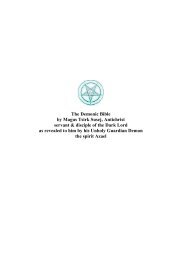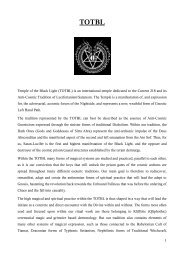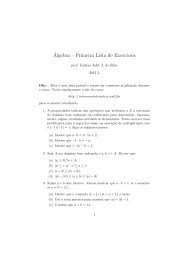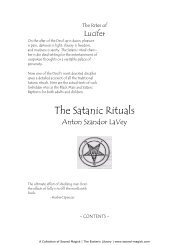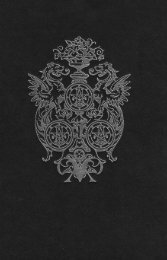Satanism Today - An Encyclopedia of Religion, Folklore and Popular ...
Satanism Today - An Encyclopedia of Religion, Folklore and Popular ...
Satanism Today - An Encyclopedia of Religion, Folklore and Popular ...
Create successful ePaper yourself
Turn your PDF publications into a flip-book with our unique Google optimized e-Paper software.
Aurum Solis 17<br />
Cabell, Asmodeus is the son <strong>of</strong> Sammael <strong>and</strong> Lilith<br />
(who is Adam’s first wife). In the legends <strong>of</strong><br />
Solomon, Asmodeus (also known as Saturn,<br />
Marcolf, or Morolf) is held responsible for creating<br />
carousels, music, dancing, <strong>and</strong> drama.<br />
See also Demons; Judaism<br />
For Further Reading:<br />
Godwin, Malcolm. <strong>An</strong>gels: <strong>An</strong> Endangered Species.<br />
New York: Simon <strong>and</strong> Schuster, 1990.<br />
Ronner, John. Know Your <strong>An</strong>gels. Murfreesboro, TN:<br />
Mamre, 1993.<br />
Astaroth<br />
Astaroth is mentioned in a variety <strong>of</strong> sources,<br />
<strong>of</strong>ten without much detail. In Arthur Edward<br />
Waite’s The Book <strong>of</strong> Black Magic <strong>and</strong> <strong>of</strong> Pacts it is<br />
declared that, before he fell from heaven, Astaroth<br />
was a prince <strong>of</strong> the order <strong>of</strong> thrones. In Lewis<br />
Spence’s <strong>An</strong> <strong>Encyclopedia</strong> <strong>of</strong> Occultism, it is argued<br />
that Astaroth belonged to the order <strong>of</strong> seraphim.<br />
In the Grimorium Verum, it is maintained that he<br />
has set up residence in America.<br />
Waite, in The Lemegeton, refers to Astaroth as a<br />
great duke in the infernal regions, whereas according<br />
to Francis Barrett in The Magus I, he is called<br />
Diabolus in the Greek language. It is said that<br />
when he is invoked Astaroth manifests as “a beautiful<br />
angel astride a dragon <strong>and</strong> carrying a viper in<br />
his right h<strong>and</strong>.” According to Voltaire, Astaroth<br />
was an ancient god <strong>of</strong> Syria, whereas J. A. S. Collin<br />
de Plancy argues that he was “one <strong>of</strong> the 7 princes<br />
<strong>of</strong> Hell who visited Faust.”<br />
See also Demons; Faust; Magic <strong>and</strong> Magical Groups<br />
For Further Reading:<br />
Davidson, Gustav. A Dictionary <strong>of</strong> <strong>An</strong>gels Including<br />
the Fallen <strong>An</strong>gels. New York: Free Press, 1967.<br />
Asuras<br />
Asuras are South Asian demons, prominent in<br />
both Hinduism <strong>and</strong> Buddhism. Hinduism is a<br />
complex, multilayered tradition that has changed<br />
across the several millennia <strong>of</strong> its existence. In the<br />
Vedas, India’s earliest recoverable religious texts,<br />
the term asura is used interchangeably with the<br />
word deva, both <strong>of</strong> which refer to the gods <strong>and</strong><br />
goddesses <strong>of</strong> the Vedic pantheon. By the time <strong>of</strong><br />
the epics—the Ramayana <strong>and</strong> the Mahabharata—<br />
asura had come to mean “demon” <strong>and</strong> deva had<br />
come to mean “divine.” In the new pantheon <strong>of</strong><br />
classical Hinduism, the old Vedic gods were<br />
demoted to the status <strong>of</strong> demigods (the devas).<br />
The parallel between South Asian asuras <strong>and</strong><br />
Western demons is fairly good. In classical Hindu<br />
mythology as it is embodied in the Puranas, the<br />
devas <strong>and</strong> the asuras are locked in ongoing<br />
conflict. While the legions <strong>of</strong> the Judeo-Christian<br />
Satan failed to take over heaven in their original<br />
rebellion <strong>and</strong> were cast into hell, in South Asian<br />
mythology the asuras <strong>of</strong>ten storm out <strong>of</strong> the<br />
underworld, succeed in taking over heaven, <strong>and</strong><br />
drive the devas out. The devas then appeal to the<br />
high god (usually Vishnu, though occasionally<br />
Shiva or the Goddess), who comes to their aid,<br />
defeats the asuras, drives them back into the hell<br />
worlds, <strong>and</strong> reestablishes the deva/asura balance<br />
<strong>of</strong> power.<br />
One <strong>of</strong> the factors at work in the Hindu religious<br />
ecology that distinguishes it from Western<br />
religions is the assumption <strong>of</strong> the notion <strong>of</strong> reincarnation.<br />
As this notion was brought to bear on<br />
South Asian mythology, devas became capable <strong>of</strong><br />
ignoble actions, which could result in their<br />
punishment (their “fall”) by being reborn as<br />
asuras. Asuras, on the other h<strong>and</strong>, unlike Western<br />
demons, were capable <strong>of</strong> performing noble<br />
actions, which could result in their being rewarded<br />
by being reborn as devas.<br />
See also Hinduism; Indo-Europeans<br />
For Further Reading:<br />
Garg, Ganga Ram, ed. Encyclopaedia <strong>of</strong> the Hindu<br />
World. Vol. 3. New Delhi: Concept Publishing,<br />
1992.<br />
Stutley, Margaret, <strong>and</strong> James Stutley. Harper’s<br />
Dictionary <strong>of</strong> Hinduism: Its Mythology, <strong>Folklore</strong>,<br />
Philosophy, Literature, <strong>and</strong> History. New York:<br />
Harper & Row, 1977.<br />
Aurum Solis<br />
Aurum Solis was founded in 1897 in Engl<strong>and</strong> by<br />
Charles Kingold <strong>and</strong> George Stanton. It was originally<br />
opened as a school <strong>of</strong> high cabalistic magic.<br />
Its philosophies are centered around the idea <strong>of</strong><br />
the magician who chooses to follow a path <strong>of</strong><br />
sacrifice, <strong>and</strong> who is reborn <strong>and</strong> passes into the




